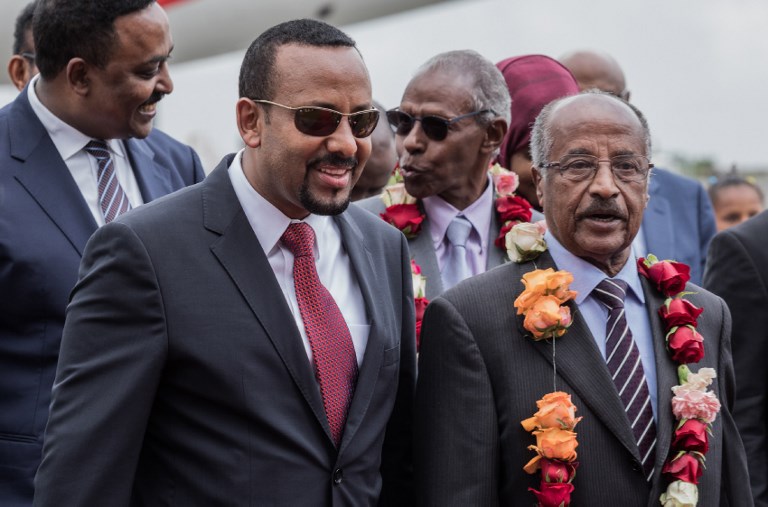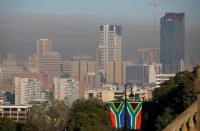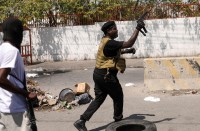
by Chris Stein
Agence France-Presse
ADDIS ABABA, Ethiopia (AFP) – Ethiopia rolled out the red carpet and hosted a dinner for Eritrea’s top diplomat on Tuesday as the two nations took the next step in a historic initiative aimed at ending decades of conflict and hostility.
The thaw between the foes who fought a bitter border war 20 years ago comes after an olive branch was dramatically offered by new Ethiopian prime minister, Abiy Ahmed.
Eritrea’s top diplomat Osman Saleh and presidential adviser Yemane Gebreab exchanged smiles and conversation with Abiy at a dinner in Addis Ababa’s National Palace before the prime minister gave a speech lauding the economic benefits rapprochement would bring to the Horn of Africa.
“Like you, we have the same feeling in (the Eritrean capital) Asmara,” Yemane replied, to applause from a crowd of political elites.
The Eritreans had arrived earlier in the day at the capital’s airport, where Abiy greeted them and led them past a brass band and along a red carpet lined with culture and sports personalities, among them legendary long-distance runner Haile Gebrselassie.
Abiy then held talks with the Eritrean delegation, his chief of staff Fitsum Arega said in a tweet.
The meeting comes just three days after a blast at a rally attended by Abiy — a sign, analysts say, of the risks the 42-year-old prime minister has taken with a programme that embraces the biggest reforms, at home and abroad, in a generation.
Earlier this month, Abiy said he would abide by a 2002 ruling, issued by a United Nations-backed commission, and withdraw from contested territory, including Badme, a town claimed by both sides.
Last week, Eritrean President Isaias Afwerki responded, saying he would dispatch a delegation “to gauge current developments directly and in depth as well as to chart out a plan for continuous future action.”
He stopped short of calling it a peace delegation but an official visit alone marks a dramatic shift in relations long mired in suspicion and bloody hostility.
The last time Ethiopian and Eritrean troops fought head-on was two years ago, with each side claiming victory in response to what they said was the other’s aggression.
Deadly war, risky peace
A former province, Eritrea voted for separation from its much larger neighbor in 1993 following a three-decade independence war.
But just five years later, a new border war erupted between the two countries, killing around 80,000 people before it ended in stalemate in 2000.
Ethiopia ignored the subsequent ruling that it should withdraw from territory awarded to Eritrea.
Since then, a tense standoff has persisted with both maintaining a war footing, shots occasionally fired and with each side backing the other’s rebels.
The apparent detente in recent weeks has raised hopes of a normalisation of relations that might boost regional trade and ease tensions.
Their long cold war has stymied economic development, frozen political relations and helped justify domestic repression.
Change in the mood
But on Tuesday, signs of an abrupt mood change were evident, with Eritrean and Ethiopian flags lining the main road to the airport alongside banners reading “Welcome” in Amharic and Tigrinya, the languages of the two countries.
“The relationship between Ethiopia and Eritrea is about more than the border. When we make peace, it will benefit all of east Africa,” Ethiopia’s foreign affairs spokesman Meles Alem told journalists after the Eritrean officials arrived.
For both Abiy and Isaias, the potential reconciliation contains risks.
A grenade exploded at a rally addressed by Abiy on Saturday, a rare event in tightly-controlled Ethiopia.
The motive for the attack remains unknown but the pace of Abiy’s reforms — including the border concession to Eritrea — is a likely source of anger among some hardliners in the ruling class and security services, say observers.
“The key thing to watch out for is Abiy’s ability to rise over the inevitable disappointment or sense of betrayal … over the Eritrea decision,” Christopher Clapham of Britain’s Cambridge University said earlier this month, after Abiy’s surprise overture.
For his part, Isaias has long justified his restrictive rule, punishing military conscription and the jailing of dissidents as necessary to defend Eritrea against Ethiopian aggression.
His authoritarian leadership has left his country diplomatically isolated and burdened by sanctions, triggering an exodus of Eritreans, many of them taking the dangerous route to Europe.
However, his own position is largely unchallenged.
Agence France-Presse







